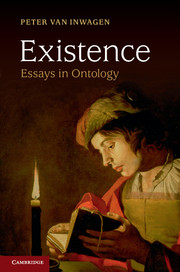Book contents
- Frontmatter
- Contents
- Preface
- Introduction: inside and outside the ontology room
- Chapter 1 Five questions
- Chapter 2 The new antimetaphysicians
- Chapter 3 Being, existence, and ontological commitment
- Chapter 4 Existence, ontological commitment, and fictional entities
- Chapter 5 Can variables be explained away?
- Chapter 6 Quine's 1946 lecture on nominalism
- Chapter 7 Alston on ontological commitment
- Chapter 8 A theory of properties
- Chapter 9 What is an ontological category?
- Chapter 10 Relational vs. constituent ontologies
- Chapter 11 Can mereological sums change their parts?
- Chapter 12 Causation and the mental
- Index
- References
Chapter 3 - Being, existence, and ontological commitment
Published online by Cambridge University Press: 05 June 2014
- Frontmatter
- Contents
- Preface
- Introduction: inside and outside the ontology room
- Chapter 1 Five questions
- Chapter 2 The new antimetaphysicians
- Chapter 3 Being, existence, and ontological commitment
- Chapter 4 Existence, ontological commitment, and fictional entities
- Chapter 5 Can variables be explained away?
- Chapter 6 Quine's 1946 lecture on nominalism
- Chapter 7 Alston on ontological commitment
- Chapter 8 A theory of properties
- Chapter 9 What is an ontological category?
- Chapter 10 Relational vs. constituent ontologies
- Chapter 11 Can mereological sums change their parts?
- Chapter 12 Causation and the mental
- Index
- References
Summary
I
Ontology is a very old subject, but ‘ontology’ is a relatively new word. (Ontologia seems to have been a seventeenth-century coinage.) After the passing of the Wolff–Baumgarten school of metaphysics, and before the twentieth century, ‘ontology’ was never a very popular word, except, perhaps, among the writers of manuals of scholastic philosophy. Currently, however, the word is very fashionable, both among analytical philosophers and philosophers in the existential-phenomenological tradition. Its popularity with the former is due to Quine, and its popularity with the latter is due to Heidegger.
Quine uses ‘ontology’ as a name for the study that attempts to answer the ‘ontological question’: what is there? Quine's conception of this study belongs to an identifiable tradition in the history of thinking about being. Most analytical philosophers would probably point to Kant and Frege and Russell as Quine's most important predecessors in that tradition, and would probably find its roots in the attempts of various philosophers to come to terms with the ontological argument for the existence of God. Heidegger and his followers, however, see the tradition Quine represents – but they would be unlikely to identify it by reference to Quine – as much older and more pervasive. (So pervasive, in fact, as to have been for a long time now the only tradition, its adherents being no more aware of it than a fish is of water.)
- Type
- Chapter
- Information
- ExistenceEssays in Ontology, pp. 50 - 86Publisher: Cambridge University PressPrint publication year: 2014
References
- 4
- Cited by

